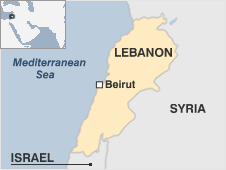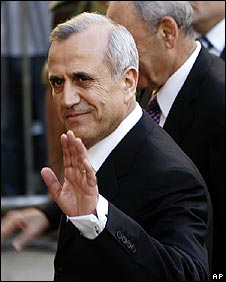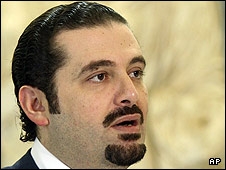Generic Medicines
Taj Pharma is the largest generic pharmaceutical company in India. We hold top positions in different established markets worldwide generics markets..
One of the most complex and divided countries in the region, Lebanon has been on the fringes, and at times at the heart, of the Middle East conflict surrounding the creation of Israel.
 |
Since a resurgence of hostilities in 2006, when Israel launched
a major military campaign against the Lebanon-based Shia Muslim armed group Hezbollah, the country has struggled to regain the relative stability it enjoyed after the 1975-1990 civil war.
A small, mountainous country, Lebanon was under French mandate until independence in 1943. Its population is a mixture of Christian sects, Sunni Muslims, Shia Muslims, Druze and others, having been a refuge for the region's persecuted minorities.
AT-A-GLANCE
A country full of promise after civil war between 1975 and 1990, Lebanon was again hit by war in 2006
Politics: A power-sharing deal ensures political representation for all major religious blocs; the unity government formed in 2009 includes ministers from across the political spectrum
International: An expanded multinational UN peacekeeping force is being deployed to police a ceasefire between Israel and Hezbollah in southern Lebanon
|
Government structures are divided between the various groups. Lebanon has also seen several large influxes of Palestinian refugees, most of whom have limited legal status.
From 1975 until the early 1990s Lebanon suffered a bloody civil war in which regional powers - particularly Israel, Syria and the Palestine Liberation Organisation - used the country as a battlefield for their own conflicts.
Syrian troops moved in shortly after the war started. Israeli troops invaded in 1978 and again in 1982 before pulling back to a self-declared "security zone" in the south from which they withdrew in May 2000.
Syria exerts considerable political clout in Lebanon, although it withdrew its troops in 2005, ending a 29-year military presence.
This followed the assassination in Beirut of former prime minister Rafik Hariri . Lebanese groups then in opposition accused Syria of involvement; Damascus denied the charge. Huge pro- and anti-Syria rallies were held in Beirut, triggering the government's downfall and the Syrian pullout.
POLITICAL PARTIES
March 14 - Coalition that retained parliamentary majority in June 2009 elections; pro-western members pushed for exit of Syrian forces; named after mass demonstrations that followed killing of ex-premier Rafik Hariri
Hezbollah - Pro-Syrian Shia political party with a militant wing that resisted the might of Israel in the war of July 2006
Amal - Pro-Syrian Shia political party led by parliamentary Speaker Nabih Berri; allied with Hezbollah
Free Patriotic Movement - Largely Christian party led by former army chief Michel Aoun; has ties with Hezbollah
|
The Hariri case appeared to have taken a major step forward on 1 March 2009 when an international court into the killing opened in the Hague.
However, in May, it ordered four pro-Syrian generals held over the killing freed, saying there was not enough evidence to convict them.
The generals' release was a boost to pro-Syrian groups, which insist that Damascus was not involved in the Hariri assassination.
The UN has demanded the dismantling of all armed groups in Lebanon, including Palestinian militias and the military wing of Hezbollah, a powerful Shia Muslim movement that controls much of southern Lebanon and enjoys Syrian and Iranian support.
When Hezbollah militia seized two Israeli soldiers in a raid in July 2006, Israel responded with a 34-day military offensive and a blockade. Around 1,000 Lebanese, most of them civilians, were killed. The damage to civilian infrastructure was wide-ranging.
International peacekeepers were drafted in to help police a UN-brokered ceasefire. But Hezbollah's leader has rejected calls for the movement to disarm and political divisions in Beirut cloud the issue of what should be done about the group's military presence in the south.
With its high literacy rate and traditional mercantile culture, Lebanon has traditionally been an important commercial hub for the Middle East.
President: Michel Suleiman
The Lebanese parliament finally elected General Michel Suleiman as president in May 2008 after six months of political stalemate that followed the departure of the previous president, Emile Lahoud, in November 2007.

President Suleiman's refusal to take sides has won him respect
|
The agreement that paved the way for his election ended some of the worst factional violence since Lebanon's 1975-1990 civil war.
As mounting clashes raised fears of a renewed civil war, the Western-backed government and the Hezbollah-led opposition agreed on General Suleiman - the head of the country's armed forces - as a compromise candidate.
On taking office, the new president hailed the opening of a new phase in Lebanese history, saying that his fellow countrymen had "refused to succumb to self-destruction".
General Suleiman stood unopposed for the presidency, and is widely seen as a unifying figure, whose apparent neutrality has earned him the respect of both sides of the political divide. He is credited with having kept the army on the sidelines in times of political crisis.
He is a Maronite Christian, and so his election also met the requirement of Lebanon's complex power-sharing system that the presidency should be held by a member of that sect.
Prime minister: Saad Hariri
Saad Hariri, the son of assassinated former prime minister Rafik Hariri, was asked to form a government by President Michel Suleiman following parliamentary elections in June 2009.

Saad Hariri eventually formed a unity government after months of talks
|
The pro-Western March 14 alliance led by Mr Hariri won 71 of parliament's 128 seats in the elections, while the rival March 8 alliance, led by Hezbollah and backed by Syria and Iran, secured 57.
Mr Hariri spent more than four months negotiating with opposition groups on the assignment of portfolios in a government of national unity. Under the agreement finally reached in November, 15 ministers were appointed from the majority bloc made up of Mr Hariri's Sunni Muslim Future movement and its Maronite Christian and Druze allies.
Hezbollah was given two cabinet posts, while its allies - the Shia Amal movement and the bloc of the Maronite Christian leader and former general Michel Aoun - were awarded another eight.
The five remaining ministers in the 30-member unity government were nominated by President Suleiman. These ministers will hold the balance of power and make it possible for Mr Hariri's supporters in the cabinet to gain a simple majority.
The protracted deadlock over the formation of the new government had given rise to fears of renewed instability, and Mr Hariri hailed the eventual reaching of a compromise deal by declaring that it "opened a new page, which we hope will be one of agreement and co-operation".
Lebanon's broadcasting scene is well-developed, lively and diverse, reflecting the country's pluralism and divisions.
It was the first Arab country to permit private radio and television stations. But the government has a say over who may operate stations and whether or not they can broadcast news. Several stations are owned by leading politicians.
 Courting controversy: Hezbollah's Al-Manar TV
|
Press freedom body Reporters Without Borders says the media have more freedom in Lebanon than in any other Arab country, but nevertheless face "political and judicial machinations".
Most broadcasters were set up after the civil war by Muslim and Christian factions. Commercial operators Future TV and LBC attract the lion's share of the viewing audience. Take-up of satellite and cable TV is widespread.
Al-Manar TV, backed by the militant group Hezbollah, has aroused controversy. A French court banned the station's satellite channel in 2004 on the grounds of anti-Semitism. The station was targeted by Israeli air raids during military operations against Hezbollah in July 2006.
There are dozens of private radio stations. Broadcasts from BBC Arabic and Radio France Internationale are carried by partner stations.
Criticism of officials and policies is carried daily in dozens of newspapers and hundreds of periodicals. While there are no censorship laws, restrictions in press laws forbid the media from defaming the president or other heads of state and from inciting sectarian strife.
By August 2007, Lebanon had 950,000 internet users, representing 21% of the population, according to the ITU.
The press:
Television:
Radio:
News agency:
Lebanese National News Agency - state-run
AFRICA | ASIA-PACIFIC | AMERICAS | EUROPE | MIDDLEEAST | SOUTHASIA
![]()
![]()
![]()
Mauritania Mauritius Morocco Mozambique Namibia Niger Nigeria Republic-of-congo Rwanda Sao-tome-and-principe Senegal Seychelles Sierra-leone Somalia South-africa Sudan Swaziland Tanzania The-gambia Togo Tunisia Uganda Australia Brunei Burma Cambodia China East-timor Fiji Indonesia Japan Kazakhstan Kiribati Kyrgyzstan Laos Malaysia Marshall-islands Micronesia Mongolia Nauru New-zealand North-korea Palau Papua-new-guinea Samoa Singapore Solomon-islands South-korea Taiwan Tajikistan Thailand The-philippines Tonga Turkmenistan Tuvalu Uzbekistan Vanuatu Vietnam Antigua-and-barbuda Belize Bolivia Brazil Canada Chile Colombia Costa-rica Cuba Dominica Dominican-republic Ecuador El-salvador Grenada Guatemala Guyana Haiti Honduras Jamaica Mexico Nicaragua St-kitts-and-nevis St-lucia Suriname Trinidad-and-tobago Uruguay Venezuela Albania Andorra Armenia Austria Azerbaijan Belarus Belgium Bosnia-hercegovina Bulgaria Croatia Cyprus Czech-republic Denmark Estonia Finland France Georgia Germany Greece Hungary Iceland Ireland Italy Latvia Liechtenstein Lithuania Luxembourg Macedonia Malta Moldova Monaco Montenegro Norway Poland Portugal Russia San-marino Serbia Slovakia Slovenia Spain Sweden Algeria Egypt Iran Iraq Israel-and-palestinian-territories Jordan Kuwait Lebanon Libya Mauritania Oman Saudi-arabia Sudan Syria Tunisia United-arab-emirates Yemen Afghanistan Bangladesh Bhutan India Nepal Pakistan Sri-Lanka The-Maldive